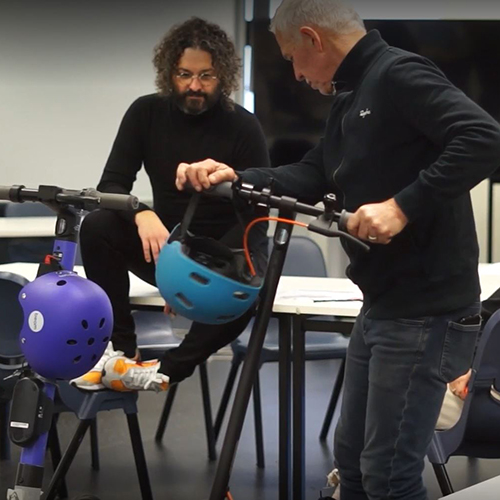24 October 2022

Global micromobility company Beam and the University of South Australia have launched the ‘Future Scooter Lab’ educational initiative, offering students hands-on learning aimed at shaping the future of Australia’s micromobility industry.
The Future Scooter Lab allows tertiary students to engage with the real-world challenges of the micromobility industry via a research project, with Beam providing industry problem statements that UniSA students will solve as part of their coursework.
Students from the undergraduate Bachelor of Design, Product Design and postgraduate Master of Design (Industrial Design specialisation) Programs at UniSA will engage in research to investigate personal transport and mobility systems, identifying trends and opportunities for future vehicle design.
The students then develop their research into a design brief, which they execute using an iterative design process. The final device and system aim to address key tactical issues in the industry and identify future opportunities for growth.
As part of Future Scooter Lab, students will receive feedback on their work from Beam’s product and operational teams and have access to Beam’s data and resources to ensure real-world relevance to their work.
The Future Scooter Lab includes:
- Practical tours and hands-on demonstrations at Beam’s warehouses
- Guest lectures from Beam’s product, operations and strategy managers on the industry, its growth and opportunities, and challenges
- The ability for students to design or contribute to the next generation of e-mobility devices, incorporating real-world applications
Beam’s General Manager (ANZ) Tom Cooper says:
“The shared micromobility industry has progressed quickly since it was first introduced to Australia in 2018, with great advances in geofencing technology, AI and machine learning that have made it possible for the industry to scale as quickly as it has.
“As the industry continues to grow, it’s vital that we are able to educate and nurture local talent who will be able to take on the new challenges of micromobility as we work to make an impact on congestion in our cities.
“Beam’s Future Scooter Lab is an opportunity for tertiary students studying relevant subjects such as engineering and industrial design to find out more about a new but rapidly changing industry, and understand the real-world implications that their work will have when they graduate.
“We also learn from the students, just as much as they learn from us, with the students providing insights from their research process that we then incorporate into our operations strategies.”
UniSA’s Program Director: Bachelor of Design, Dan McLean says:
“This project presents an outstanding opportunity for the Product and Industrial Design students at UniSA. Working on real projects that can have real-world impact is something that we aim to facilitate for our students, and we are thrilled to be able to work closely with a global company like Beam.
“Recently, we have worked on mobility projects with our students including solar cars and future buses, so the micromobility project with Beam fits nicely with our previous projects, designing how cities of the future can facilitate accessible mobility for all.
“It is exciting to be part of the Beam Future Scooter Lab, and this will benefit both our Product and Industrial Design students and staff with opportunities to work on real future mobility challenges with real-world outcomes.”
For media queries, please contact:
Michelle Leong
Head of Communications & PR
+61479062812
michelle@ridebeam.com
Learn more about the Future Scooter Lab on UniSA's YouTube channel.



